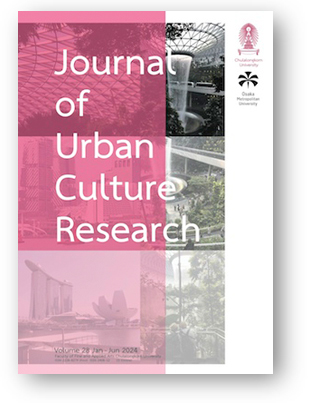Exploring the Use of Idealistic Concepts and Symbolic Interpretation to Enhance the Urban Context for People with Disabilities in an Installation Art Exhibition of Urban ThisAbility
DOI:
https://doi.org/10.14456/jucr.2024.9Keywords:
Idealism; Disabilities; Symbolic Interpretation; Grid; Installation ArtAbstract
This article explores the design approach of the art installation titled "Urban ThisAbility" which received funding from Bangkok Design Week 2023 and created by artists Torpong Limlunjakorn, Pornrak Chowvanayotin and Arnun Chantan. This project aims to raise awareness about ideal urban environments that accommodate people with disabilities. The artworks are created within the constraints of the installation venue to effectively convey this message. It also explores the cognitive processes involved in creating spatial and symbolic interpretations using grid concepts, reflective elements, and luminous emitting, drawing from relevant literature. The art installation was crafted through a comprehensive process to foster contemporary artistic awareness. The “Urban ThisAbility” project garnered positive feedback for its artistic merits and successful dissemination of awareness about urban mobility challenges for people with disabilities. Additionally, the responses from individuals with disabilities towards this work were insightful. This article seeks to be a valuable resource for students and enthusiasts of installation art and symbolic interpretation, providing a foundation for future studies in this field.
Downloads
Published
Versions
- 2024-07-07 (2)
- 2024-06-24 (1)
How to Cite
Issue
Section
License

This work is licensed under a Creative Commons Attribution-NonCommercial-NoDerivatives 4.0 International License.
Authors authorize the JUCR to publish their materials both in print and online while retaining their full individual copyright. The copyright of JUCR volumes is retained by Chulalongkorn University.
The views and opinions expressed herein are those of the individual author(s) and do not necessarily reflect the policies or opinions of the Journal (JUCR), it editors and staff, Chulalongkorn University, or Osaka Metropolitan University.








